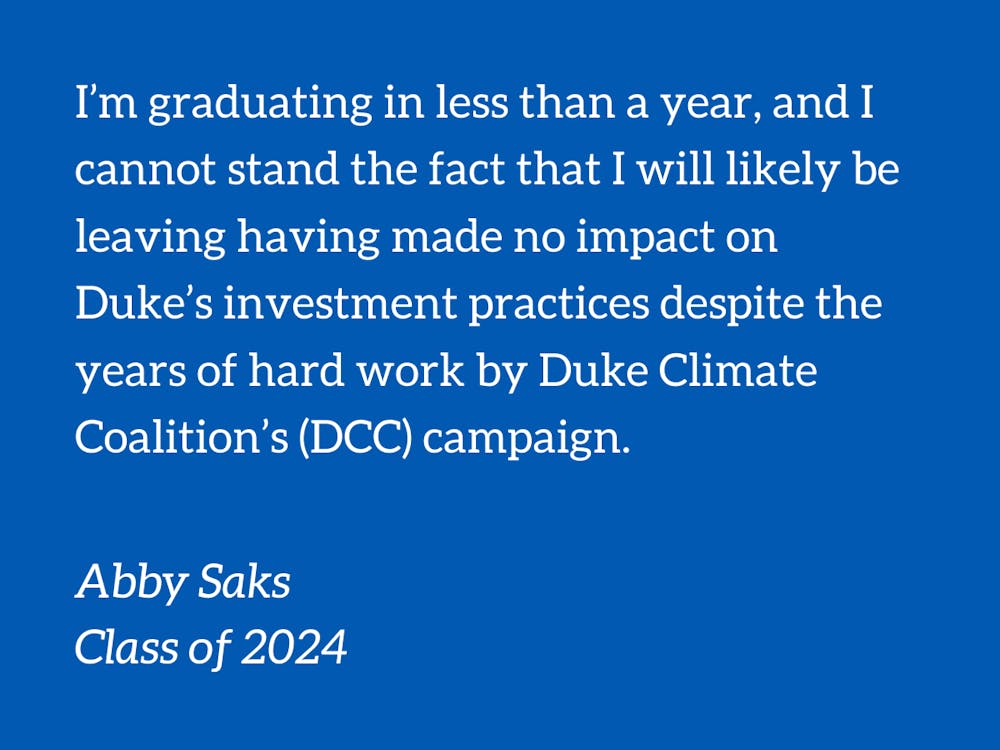I have been active in the campaign to get Duke to fully divest from fossil fuels since I was a freshman. I went into it knowing it would be frustrating and that the work would rarely yield any significant results. Still, I’m graduating in less than a year, and I cannot stand the fact that I will likely be leaving having made no impact on Duke’s investment practices despite the years of hard work by Duke Climate Coalition’s (DCC) campaign. I have tried my best to be patient, to understand that the bureaucracy of a college administration can often hinder rapid change, but I am sick of being patient. As I write this, many island nations are facing the threat of becoming uninhabitable in the coming decades, millions of people are dying annually because of climate change and we have already passed the point of no return. Now is not the time to slowly let things happen at a pace that our current system feels comfortable with.
My impatience was only furthered after I attended the first session of a year-long series hosted by the Duke Office of Climate and Sustainability, where they overall plan to discuss “how best to balance our fiduciary requirements with our institutional values.” To be clear, in writing this, I am not opposed to open discussions surrounding how we can improve Duke’s investments, nor am I discrediting the work of the Office of Climate and Sustainability. However, I was incredibly frustrated by much of what was discussed during this first session. The topic of discussion frequently returned to the focus of these sessions — balancing fiduciary duty with institutional values. I yet again heard arguments as to why Duke’s endowment gains are more important than my future and, more importantly, the future of countries facing climate disaster.
I obviously can’t speak for every student that was there, but there seemed to be a common sentiment of frustration with Duke for not putting its money where its mouth is. With its recent Climate Commitment, Duke wants its students to enter careers that help solve climate change, but the example Duke sets with its current investments in fossil fuels is that it is okay to prioritize profits over the well-being of our planet. It is no shock, then, that the large majority of Duke students instead enter careers in the generally more profitable finance and consulting sectors, oftentimes at the companies that are fueling the climate crisis or at the banks that are financing it.
Discussions for the sake of making change are worthwhile, but discussions that bring up all of the same arguments against divestment — arguments which I, as a first-year interested in divestment, initially read about in the 2019 Advisory Committee on Investment Responsibility (ACIR) report supporting continued investment in fossil fuels, then had repeated to me during every ACIR meeting that I have attended and — with other members of DCC — have since have argued against in op-eds, legal complaints, reports to the ACIR and protest speeches.
I really hope that something comes out of these sessions, and maybe it is the cynical upperclassman Duke student in me that’s making me think otherwise. But if these sessions are all that I and the other graduating members of DCC get instead of actual concrete divestment commitments, then I guess Duke is at least preparing me for a career in environmental activism filled with disappointment and fruitless labor, where the work you do is never enough to create systemic change.
Abby Saks is a member of Trinity's Class of 2024 and co-president of the Duke Climate Coalition.
The Chronicle is committed to highlighting voices from the Duke community. If you're interested in submitting a guest column, email opinion@dukechronicle.com.
Get The Chronicle straight to your inbox
Signup for our weekly newsletter. Cancel at any time.

